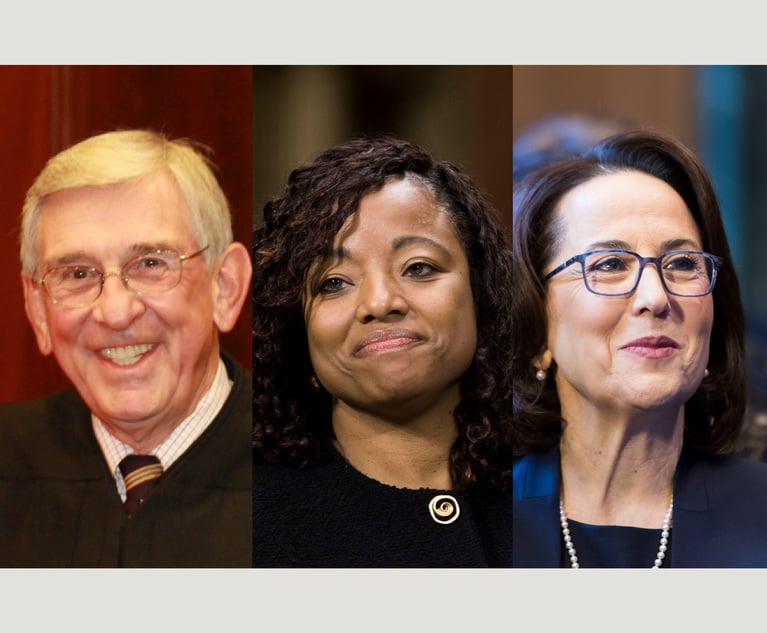UPDATED: DC Circuit Declines to Allow Pregnant Undocumented Teen to Get Abortion, For Now
The D.C. Circuit gave the Department of Health & Human Services until Oct. 31 to find a sponsor for the 17-year-old, in which case she would be free from HHS custody and allowed to get the abortion.
October 20, 2017 at 06:14 PM
8 minute read
 Patricia Millett.
Patricia Millett.
In a 2-1 ruling Friday, the U.S. Court of Appeals for the D.C. Circuit refused to require the government to allow a detained undocumented 17-year-old to get an abortion.
In a two-page order, the court gave the Department of Health & Human Services until 5 p.m. on Oct. 31 to find a sponsor for the girl, at which point she would be free to leave the government's custody and get an abortion. The girl, known only as Jane Doe, is being held in a federally funded shelter in Texas.
The court also vacated sections of the lower court's temporary restraining order, issued Wednesday, that forced the government to allow Doe to be transported to an abortion facility. The appeals court remanded the case to the district court and said that should HHS not be able to secure a sponsor, the order said the lower court could re-enter its temporary restraining order, and the government could then appeal again.
The ruling came just hours after the appeals court held oral argument on the case Friday morning. Judges Brett Kavanaugh and Karen Henderson, appointed by Presidents George W. Bush and Ronald Reagan, respectively, were in the majority. Judge Patricia Millett, appointed by President Barack Obama, dissented.
Millett wrote a scathing dissent, in which she said the government's position was “wrong and unconstitutional.”
“The government's refusal to release [Doe] from custody is not just a substantial obstacle; it is a full-on, unqualified denial of and flat prohibition on J.D.'s right to make her own reproductive choice.”
Millett wrote that contrary to its argument, the government is not facilitating the abortion. Doe will be transported to the procedure by her guardian, expenses will be paid by her guardian and attorneys, and paperwork and medical care will be provided by a government contractor.
Millett also took issue with the government admitting Doe would be able to get an abortion in ICE custody if she were a few months older.
“The government identifies no case that says the government has a right to flatly prohibit an abortion—to override the woman's choice—by virtue of keeping her in custody,” Millett wrote. “And to be clear, it is a custody from which the government would willingly release her to attend doctor appointments if she were to continue her pregnancy.”
The order also said Henderson would file a statement concurring within five days.
The government argued in the case that because the minor had the option of either returning to her home country or securing a sponsor, HHS' refusal to allow her to leave the shelter to get an abortion was not imposing an undue burden. In the order, the judges said they agreed, “so long as the process of securing a sponsor to whom the minor is released occurs expeditiously.”
Time is of the essence in the case. Doe is in her 15th week of pregnancy. By Oct. 31, she will be in her 17th. Texas bars abortion after 20 weeks, and requires that the same doctor do both the procedure itself as well as pre-procedure counseling 24 hours before. The American Civil Liberties Union is concerned that because of the availability of doctors willing to perform the procedure, Doe may be forced to travel hundreds of miles to get the procedure if she can get it in time at all.
The ACLU brought the case on behalf of Doe, arguing that by refusing to allow her to leave the shelter, the government was effectively violating her constitutional right to an abortion. During oral arguments Friday, Justice Department lawyer Catherine Dorsey said the government was not taking a position in the case about whether undocumented immigrants have a right to an abortion, but that even if they did, that right was not being violated.
“We note that the government has assumed, for purposes of this case, that J.D. —an unlawful immigrant who apparently was detained shortly after unlawfully crossing the border into the United States—possesses a constitutional right to obtain an abortion in the United States,” the order noted.
 Patricia Millett.
Patricia Millett.
In a 2-1 ruling Friday, the U.S. Court of Appeals for the D.C. Circuit refused to require the government to allow a detained undocumented 17-year-old to get an abortion.
In a two-page order, the court gave the Department of Health & Human Services until 5 p.m. on Oct. 31 to find a sponsor for the girl, at which point she would be free to leave the government's custody and get an abortion. The girl, known only as Jane Doe, is being held in a federally funded shelter in Texas.
The court also vacated sections of the lower court's temporary restraining order, issued Wednesday, that forced the government to allow Doe to be transported to an abortion facility. The appeals court remanded the case to the district court and said that should HHS not be able to secure a sponsor, the order said the lower court could re-enter its temporary restraining order, and the government could then appeal again.
The ruling came just hours after the appeals court held oral argument on the case Friday morning. Judges Brett Kavanaugh and Karen Henderson, appointed by Presidents George W. Bush and Ronald Reagan, respectively, were in the majority. Judge Patricia Millett, appointed by President Barack Obama, dissented.
Millett wrote a scathing dissent, in which she said the government's position was “wrong and unconstitutional.”
“The government's refusal to release [Doe] from custody is not just a substantial obstacle; it is a full-on, unqualified denial of and flat prohibition on J.D.'s right to make her own reproductive choice.”
Millett wrote that contrary to its argument, the government is not facilitating the abortion. Doe will be transported to the procedure by her guardian, expenses will be paid by her guardian and attorneys, and paperwork and medical care will be provided by a government contractor.
Millett also took issue with the government admitting Doe would be able to get an abortion in ICE custody if she were a few months older.
“The government identifies no case that says the government has a right to flatly prohibit an abortion—to override the woman's choice—by virtue of keeping her in custody,” Millett wrote. “And to be clear, it is a custody from which the government would willingly release her to attend doctor appointments if she were to continue her pregnancy.”
The order also said Henderson would file a statement concurring within five days.
The government argued in the case that because the minor had the option of either returning to her home country or securing a sponsor, HHS' refusal to allow her to leave the shelter to get an abortion was not imposing an undue burden. In the order, the judges said they agreed, “so long as the process of securing a sponsor to whom the minor is released occurs expeditiously.”
Time is of the essence in the case. Doe is in her 15th week of pregnancy. By Oct. 31, she will be in her 17th. Texas bars abortion after 20 weeks, and requires that the same doctor do both the procedure itself as well as pre-procedure counseling 24 hours before. The American Civil Liberties Union is concerned that because of the availability of doctors willing to perform the procedure, Doe may be forced to travel hundreds of miles to get the procedure if she can get it in time at all.
The ACLU brought the case on behalf of Doe, arguing that by refusing to allow her to leave the shelter, the government was effectively violating her constitutional right to an abortion. During oral arguments Friday, Justice Department lawyer Catherine Dorsey said the government was not taking a position in the case about whether undocumented immigrants have a right to an abortion, but that even if they did, that right was not being violated.
“We note that the government has assumed, for purposes of this case, that J.D. —an unlawful immigrant who apparently was detained shortly after unlawfully crossing the border into the United States—possesses a constitutional right to obtain an abortion in the United States,” the order noted.
This content has been archived. It is available through our partners, LexisNexis® and Bloomberg Law.
To view this content, please continue to their sites.
Not a Lexis Subscriber?
Subscribe Now
Not a Bloomberg Law Subscriber?
Subscribe Now
NOT FOR REPRINT
© 2025 ALM Global, LLC, All Rights Reserved. Request academic re-use from www.copyright.com. All other uses, submit a request to [email protected]. For more information visit Asset & Logo Licensing.
You Might Like
View All
US Courts Announce Closures in Observance of Jimmy Carter National Mourning Day
2 minute read
Who Got the Work: Gibson Dunn and Wilmer to Defend BlackRock in ESG Antitrust Lawsuit
2 minute read
New York Times Moves for $100K in Attorney Fees Against Dfinity Foundation
3 minute read
Split 4th Circuit Revives Constitutional Challenge to Child Vaccine Mandate
Trending Stories
- 1Restoring Trust in the Courts Starts in New York
- 2'Pull Back the Curtain': Ex-NFL Players Seek Discovery in Lawsuit Over League's Disability Plan
- 3Tensions Run High at Final Hearing Before Manhattan Congestion Pricing Takes Effect
- 4Improper Removal to Fed. Court Leads to $100K Bill for Blue Cross Blue Shield
- 5Michael Halpern, Beloved Key West Attorney, Dies at 72
Who Got The Work
Michael G. Bongiorno, Andrew Scott Dulberg and Elizabeth E. Driscoll from Wilmer Cutler Pickering Hale and Dorr have stepped in to represent Symbotic Inc., an A.I.-enabled technology platform that focuses on increasing supply chain efficiency, and other defendants in a pending shareholder derivative lawsuit. The case, filed Oct. 2 in Massachusetts District Court by the Brown Law Firm on behalf of Stephen Austen, accuses certain officers and directors of misleading investors in regard to Symbotic's potential for margin growth by failing to disclose that the company was not equipped to timely deploy its systems or manage expenses through project delays. The case, assigned to U.S. District Judge Nathaniel M. Gorton, is 1:24-cv-12522, Austen v. Cohen et al.
Who Got The Work
Edmund Polubinski and Marie Killmond of Davis Polk & Wardwell have entered appearances for data platform software development company MongoDB and other defendants in a pending shareholder derivative lawsuit. The action, filed Oct. 7 in New York Southern District Court by the Brown Law Firm, accuses the company's directors and/or officers of falsely expressing confidence in the company’s restructuring of its sales incentive plan and downplaying the severity of decreases in its upfront commitments. The case is 1:24-cv-07594, Roy v. Ittycheria et al.
Who Got The Work
Amy O. Bruchs and Kurt F. Ellison of Michael Best & Friedrich have entered appearances for Epic Systems Corp. in a pending employment discrimination lawsuit. The suit was filed Sept. 7 in Wisconsin Western District Court by Levine Eisberner LLC and Siri & Glimstad on behalf of a project manager who claims that he was wrongfully terminated after applying for a religious exemption to the defendant's COVID-19 vaccine mandate. The case, assigned to U.S. Magistrate Judge Anita Marie Boor, is 3:24-cv-00630, Secker, Nathan v. Epic Systems Corporation.
Who Got The Work
David X. Sullivan, Thomas J. Finn and Gregory A. Hall from McCarter & English have entered appearances for Sunrun Installation Services in a pending civil rights lawsuit. The complaint was filed Sept. 4 in Connecticut District Court by attorney Robert M. Berke on behalf of former employee George Edward Steins, who was arrested and charged with employing an unregistered home improvement salesperson. The complaint alleges that had Sunrun informed the Connecticut Department of Consumer Protection that the plaintiff's employment had ended in 2017 and that he no longer held Sunrun's home improvement contractor license, he would not have been hit with charges, which were dismissed in May 2024. The case, assigned to U.S. District Judge Jeffrey A. Meyer, is 3:24-cv-01423, Steins v. Sunrun, Inc. et al.
Who Got The Work
Greenberg Traurig shareholder Joshua L. Raskin has entered an appearance for boohoo.com UK Ltd. in a pending patent infringement lawsuit. The suit, filed Sept. 3 in Texas Eastern District Court by Rozier Hardt McDonough on behalf of Alto Dynamics, asserts five patents related to an online shopping platform. The case, assigned to U.S. District Judge Rodney Gilstrap, is 2:24-cv-00719, Alto Dynamics, LLC v. boohoo.com UK Limited.
Featured Firms
Law Offices of Gary Martin Hays & Associates, P.C.
(470) 294-1674
Law Offices of Mark E. Salomone
(857) 444-6468
Smith & Hassler
(713) 739-1250










